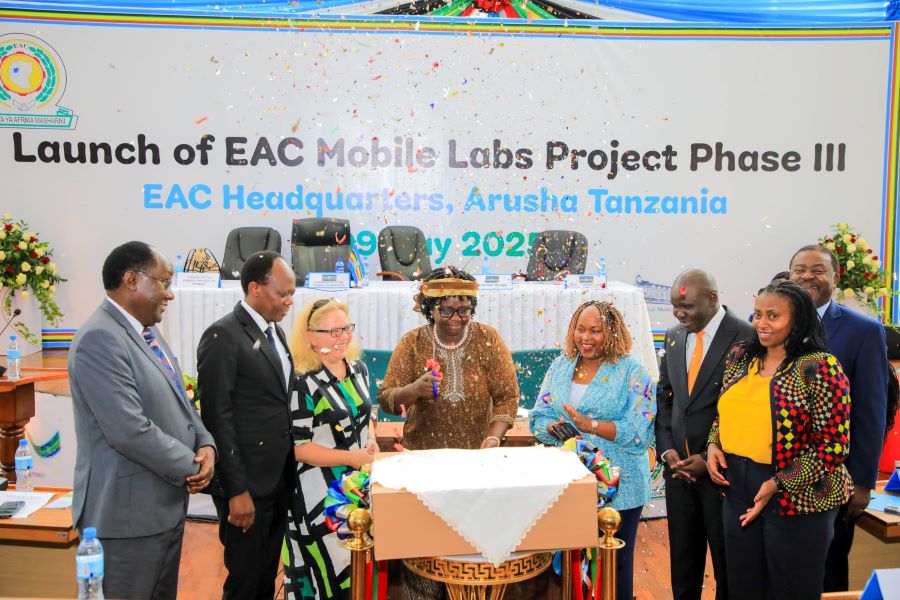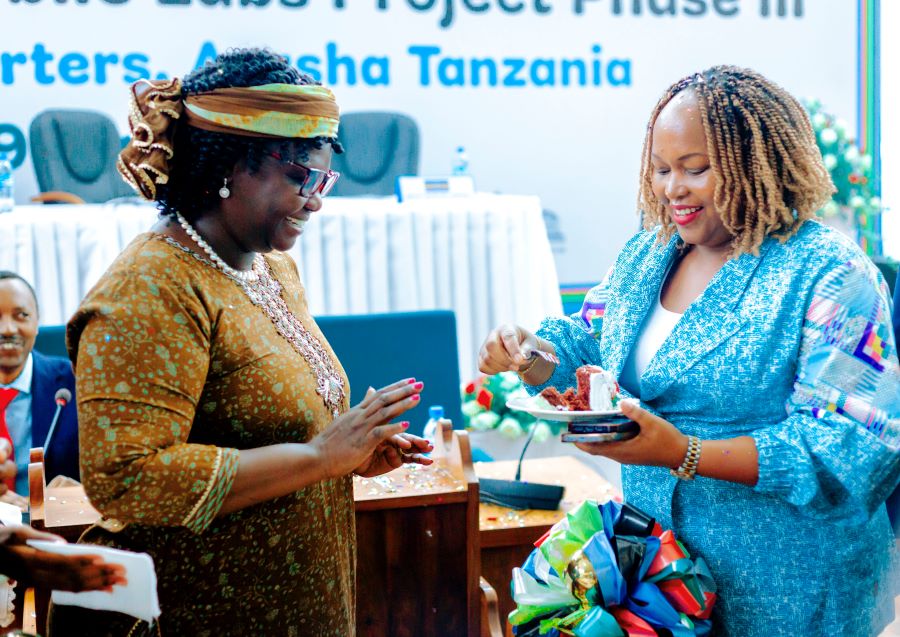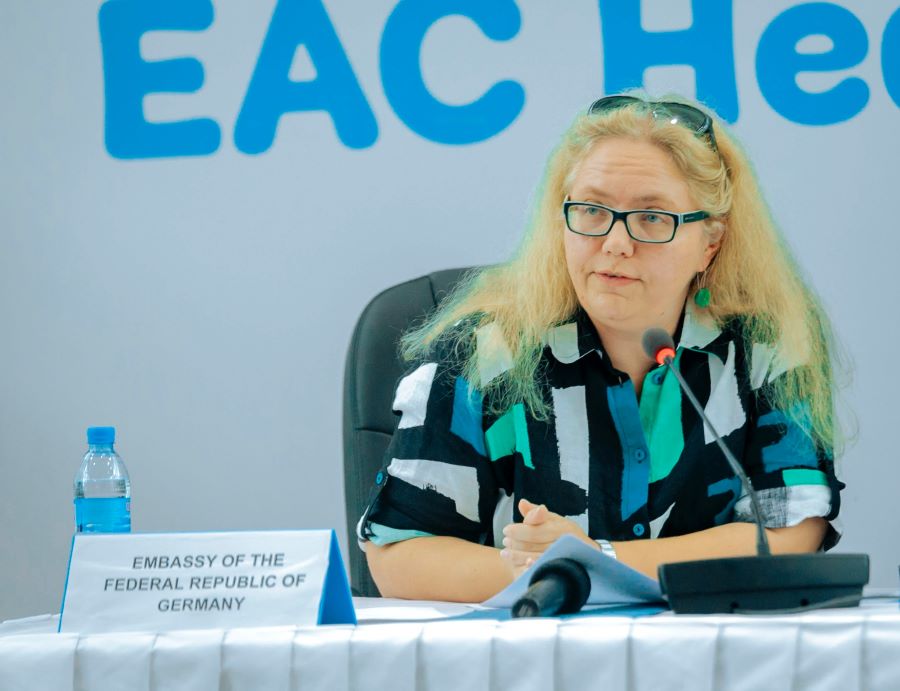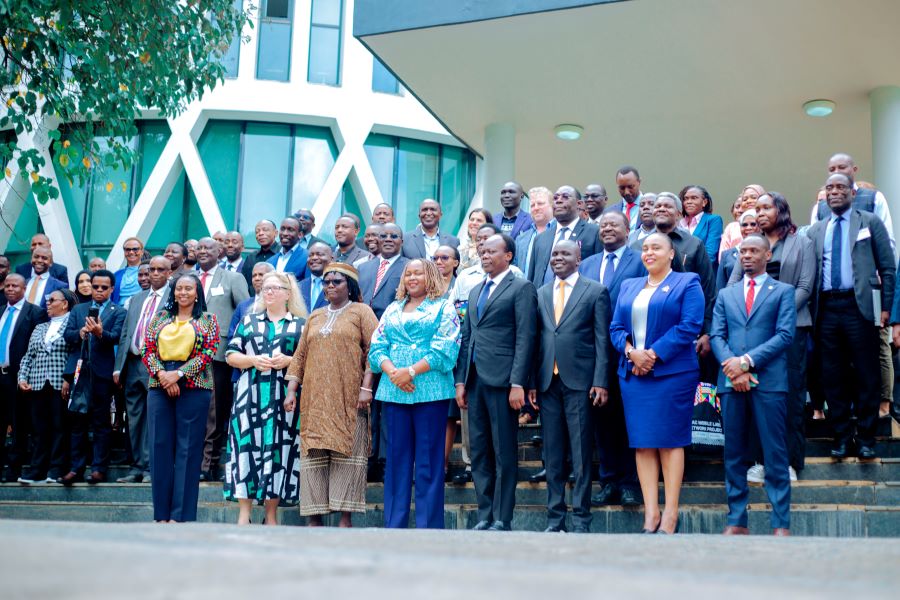
EAC secures 12 million euros for operationalisation of Phase III of the Regional Network of Reference Laboratories for Communicable Diseases Project
East African Community Headquarters, Arusha, Tanzania, 9th May, 2025: In an effort to strengthening laboratory capacities for pandemic prevention and response, in alignment with the One Health approach across the EAC region, the EAC has today launched Phase III of the Regional Network of Reference Laboratories for Communicable Diseases Project.
The three-year project from July 2025 to July 2028, supported by the Federal Republic of Germany through KfW, the German Development Bank, will specifically address the challenges posed by communicable diseases and enhance the region's readiness to respond effectively to health emergencies.
The project will also contribute to the rapid containment of disease outbreaks and a reduced burden of infectious diseases with epidemic or pandemic potential in the region.
The EAC Secretariat has been implementing the EAC regional network of reference laboratories for communicable diseases project since 2017. The goal is to strengthen laboratory capacities for rapid detection of disease outbreaks in the region. To date, the project has facilitated responses to more than over 53 disease outbreaks including: Ebola, Marburg, Rift Valley fever, Dengue, Measles/Rubella, Covid-19 and Enteric Pathogens, among other outbreaks.
Phase I of the project covered strengthening rapid detection of infectious diseases such as Ebola and Marburg viruses (established a regional network of mobile labs - nine (9) units). Phase II focused on strengthening laboratory surveillance of anti-microbial resistance (AMR) in the region. EAC is now procuring an additional six (6) container mobile lab units and 18 sequencing units under phase II
Phase III of the project will cover four components namely; Operationalisation of an EAC Regional Centre of Excellence (RCoE) for Virology at the Uganda Virus Research Institute (UVRI); fostering of relations and cooperation between human and animal health sectors through upgrading the existing EAC mobile laboratory network to One Health mobile labs; and facilitating joint conferences between human and animal health laboratories.
In addition, the project will focus on strengthening of genomic surveillance capacities at national and regional levels, and integration of the Democratic Republic of the Congo (DRC) into the established EAC mobile laboratory network and procure eight (8) mobile laboratories units for animal health to strengthen pandemic prevention and control through the One Health approach.
Speaking during the launch of the project at the EAC Headquarters in Arusha, Tanzania, the Chairperson of the Council of Ministers and Kenya’s Cabinet Secretary for EAC Affairs, Hon. Beatrice Askul Moe, said that for Partner States to work jointly in the prevention and control of communicable and non-communicable diseases as well as containment of pandemics and epidemics, there was a need for rapid and accurate laboratory detection of outbreaks covering both human, animal and environmental factors under the One Health Approach.
“As EAC Partner States, we acknowledge the significant progress made so far to combat disease outbreak and surveillance, especially diagnostic services under the mobile laboratories project. This project has contributed significantly to preventive efforts in the EAC for diseases like Covid-19, Mpox, Marburg virus disease, Ebola virus disease, and others,” said Hon. Moe.
The Chairperson reaffirmed EAC’s commitment and dedication to regional health security, joint policy development, and coordinated emergency response.

In her remarks at the launch, the EAC Secretary General, Hon. Veronica Nduva said the project has greatly strengthened the capability in the EAC region, to accurately and rapidly identify known and novel pathogens or micro-organisms that cause disease.
“The concept of deployment of mobile laboratories at hotspots of outbreaks is to reduce the time from sample collection to result release. Timely test results provide guidance to physicians for proper patient management including accurate data for surveillance of emerging and re-emerging diseases,” said Hon. Nduva.
Hon. Nduva said that by enhancing the region’s capacity for early detection of outbreaks, the EAC mobile laboratory project is contributing to easing the movement of people, which will boost the trade between Partner States and foster implementation of the EAC Common Market.
On her part, the Head of Cooperation at the German Embassy to the United Republic of Tanzania, Ms. Julia Kronberg said that “Germany stands firmly alongside the East African Community in strengthening regional health security. In a time of shifting global health priorities, our commitment to multilateralism and strategic partnerships in advancing public health remains strong, added Ms. Kronberg.
She reiterated that the launch of Phase III of the EAC mobile labs project, alongside other areas of support, marks another milestone in a long-standing cooperation, enhancing pandemic preparedness and response capacities across the region.

In this regard, the EAC Support to Pandemic Preparedness in the EAC (PanPrep) Project, supported by the German Government, through GIZ, has built critical capacities in the areas of risk and crisis communication, hygiene and sanitation and rapid response to disease outbreaks.
The EAC Secretariat in future will broaden its support to Partner States by strengthening subnational laboratory capacities and enhance regulatory preparedness, including through regional pooled procurement. Such efforts are backed by positive developments in global health such as the recent consensus on a global Pandemic Agreement.
Notes to Editors
Since 2016, BMZ, through KFW, has supported the establishment of 10 mobile labs across EAC Partner States. These labs, with an investment of approximately EUR 25 million, provide rapid diagnostic capacity essential for outbreak containment. They have proven instrumental during various disease crises, including the COVID-19 pandemic, the 2022 Ebola outbreak in Uganda, and the 2023 Marburg outbreak in Tanzania.
Currently, efforts are focused on laboratory testing capacities through the provision of diagnostic kits for Mpox and Marburg viruses and the deployment of mobile laboratories at key locations. Building on these achievements, the third phase of the EAC Regional Network of Reference Laboratories for Communicable Diseases Project is launched today with the aim to advance early detection of infectious disease in the region.
The East African Community (EAC) is a regional inter-governmental organisation comprising eight Partner States: the Republics of Burundi, Kenya, Rwanda, South Sudan, Tanzania, and Uganda, and the Democratic Republic of the Congo and the Federal Republic of Somalia. The EAC promotes sustainable development and regional integration across sectors such as trade, infrastructure, and health.
The German Federal Ministry for Economic Cooperation and Development (BMZ) steers and finances Germany’s development efforts in collaboration with global partners in civil society, the private sector, multilateral organisations, bilateral partner countries, and regional economic communities. Since 1999, Germany has committed approx. half a billion euros in development cooperation with the EAC, supporting the community's integration agenda.
The GIZ Support to Pandemic Preparedness in the EAC Region (PanPrep) Project works with the EAC Secretariat to strengthen regional pandemic preparedness and response through a One Health approach, addressing human, animal, and environmental health.
For more information, please contact:
Simon Peter Owaka
Senior Public Relations Officer
Corporate Communications and Public Affairs Department
EAC Secretariat
Arusha, Tanzania
Tel: +255 768 552087
Email: This email address is being protected from spambots. You need JavaScript enabled to view it.
About the East African Community Secretariat:
The East African Community (EAC) is a regional intergovernmental organisation of eight (8) Partner States, comprising the Republic of Burundi, the Democratic Republic of Congo, the Republic of Kenya, the Republic of Rwanda, the Federal Republic of Somalia, the Republic of South Sudan, the Republic of Uganda and the United Republic of Tanzania, with its headquarters in Arusha, Tanzania. The Federal Republic of Somalia was admitted into the EAC bloc by the Summit of EAC Heads of State on 24th November, 2023 and became a full member on 4th March, 2024
Tags: Mobile Labs

